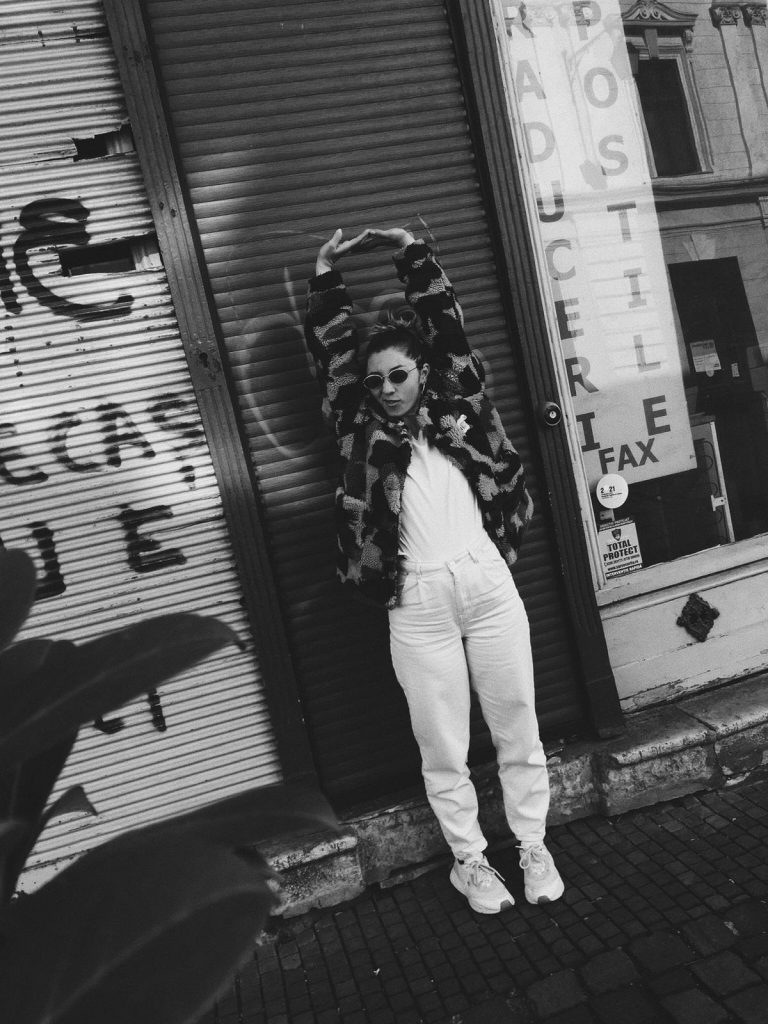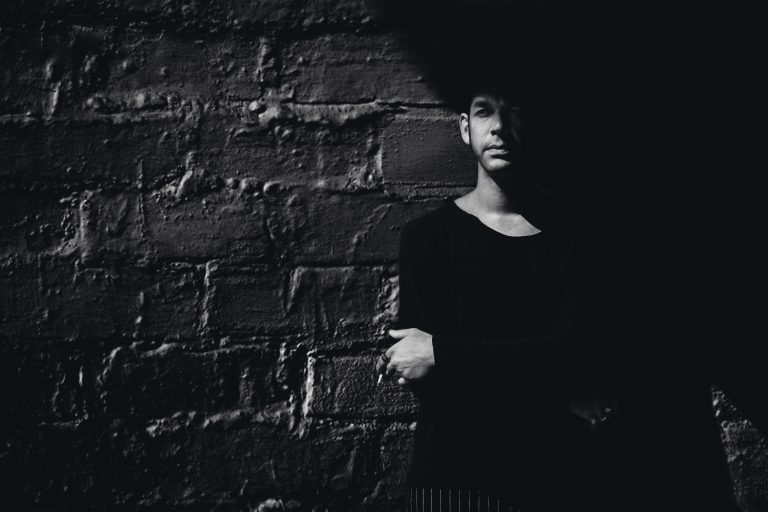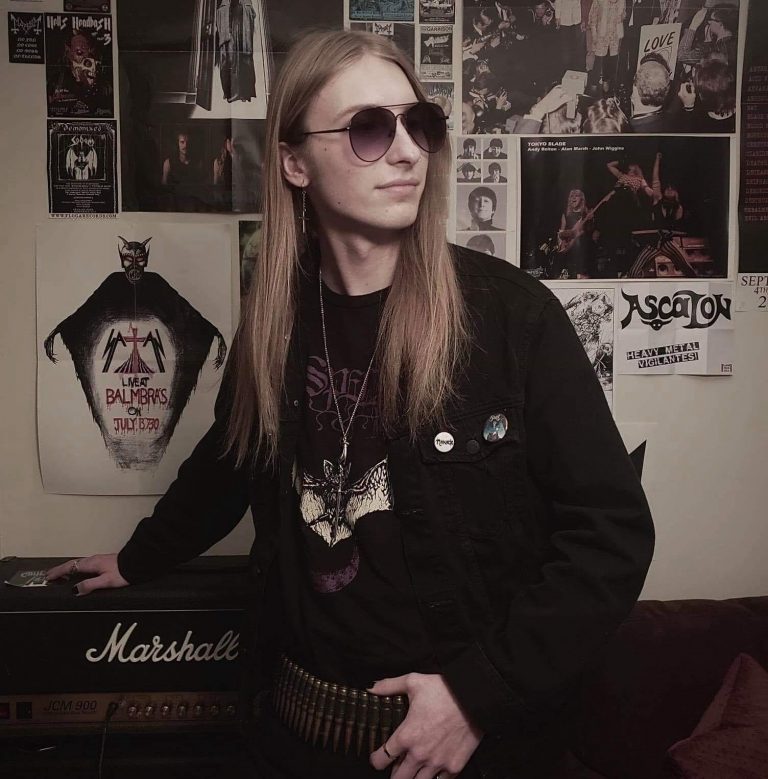https://soundcloud.com/poetrip/calculatoare-1
When did you start making music and what was the contributor factor that made you to do so?
Stefan: I was fascinated with musical instruments from a young age, but my parents and my music teacher didn’t think I had any skills. One turning point was when I met with some high school friends and, because none of us had instruments, we made music with various objects in the house: pots, pans, pillows, lamp. We thought our rehearsal was a fail, but after some more years, I found out there were many musicians who experimented like this. The only thing we lacked was confidence.
After I graduated high school, I taught myself how to play guitar and reproduce the songs I liked. At first, all of my transcriptions were completely wrong, but, in time, I perfected the notes one by one. However, it was only in my thirties that I found the right context to start my own musical project, together with Oana, seven years ago. To my surprise, although I hadn’t played the guitar all this time, I discovered that I had a completely different approach of the instrument than I did in high school, when I was more rock and blues oriented.
Oana: In childhood, I studied piano and cello for a few years, but only because I thought it would be cooler than normal school. It soon turned out it was more work than cool, haha, and I couldn’t stand the rigidity of the classes, so I gave up. I had fun playing, but no so much rehearsing the same silly tunes. After that, I didn’t think seriously about making music, I was just singing for fun from time to time. Then I met Stefan and we started Poetrip to have fun and it became a serious thing, but we’re still having fun.
How hard was it for you to create, record and release your first material?
Poetrip: Our first material was a DIY/lo-fi, in which we tried to make a short version of a 20 minutes groovy flow of consciousness. It was nice, unlike the experiences we had later in proper studios, where we realized we feared the red recording button. We didn’t promote that song in any way, we just posted it on soundcloud, but, to our surprise, it became some kind of a hit, as people still call its name at us on the street: Pufuleeeți!
What is the main art form that influenced you in creating? Was it only music or did movies and other forms of art influence your creative process?
Oana: In my music, I am mostly influenced by the life that happens all around me and my own crazy emotions. But of course everything that I am was also shaped by the movies I watched and the things I read, both prose and poetry. I love John Waters as a moviemaker and as a writer, I love Boris Vian’s crazy playfulness and the gravity of Sartre, I like the absurd and I love Bukowski’s poetry about hopelessness and self-destruction, but always tongue in cheek.
Stefan: In childhood, I once tried to not watch the cartoons and try to understand the actions by listening to the music: the punches, the laughter, the falling in love, the running. I thought it must have been a monstrous task for the composer. Other influences could be Urmuz, Daniil Harms, Garbage Pail Kids, Milo Manara.
What are the steps that an idea takes before becoming a fully fledge song? And how does that idea affects the way you build an album from the ground up?
Stefan: We have a different approach on songs than verse / chorus / bridge and we don’t have any interest in finding “the perfect” shape of a song and then locking it. We play the main idea of a song and in every gig it sounds completely different, with the tempo / key and chords / length / complexity depending on our mood. For us, a song becomes a proper “fully fledge” song in the moment we find the concept. But we don’t want to build the song’s statue and praise it.
Oana: That’s the thing, we’re not trying to build the songs, but let them develop organically. Probably, that’s why we haven’t launched an album yet. The rigours of recording scare me, because I know I will have to shape a song and I don’t like that, I’m afraid I’m gonna ruin its spontaneity. But maybe this is also a skill that we need to learn.
What do you consider the most important traits that a song and an album must have before you consider it to be completed?
Poetrip: The only reason we began to play music is that, although we listen to tons of music, we discovered that what we do is still new to us. So this is one important thing for us, not to step on other musicians’ steps. We deliberately avoid everything that sounds “heard before” – and that is a pretty hard thing to do, and probably a illusion. In short, the most important thing for a song is to become alive. That is the moment when you know that, even a simple song has become something on its own.
What are the actual steps that you take when you are creating? Do you need to enter or go to a certain setting in order to get creative?
Stefan: For me, it’s enough just to pick up the guitar or any instrument or just fool around with my voice in the shower. But it’s not that simple when you have to replicate this kind of playfulness on stage. And since what we do live is pure improvisation, I feel like I never offer the listeners completely what I have to offer. Every gig is just another failure, it rarely happens for me to be free and relaxed in front of an audience. I know that it’s not their fault, the ruthless critic is only inside my mind.
Oana: Yes, I need a certain setting, a certain mood. But I’m aware I’m wasting a lot of precious time like this. It would be nice if I could just immerse into music and forget about everything else. But I can’t play or sing if I’m hungry, if I’m cold, if the sound is bad, if I’m totally down. At the rehearsals, sometimes I can get shy or even paranoid if strangers come around.
Beside art, are there any other external or internal factors that influence you when you create, if so what are they?
Stefan: I like very much loneliness and nature, but when I listen to the birds singing I feel that there’s no need for music in the world. But then I think that music can also be healing, not just for dancing or entertainment. So I’d like to make music like that.
What is your main motivation to create and be creative?
Stefan: Life could be short, I want to take advantage of the fact that I’m alive and I can fool around.
Oana: Music is my favourite way of communication, I love to be able to express myself and connect to strangers in this subtle and indirect way, but also so powerful.
How long does it take to go from a song to an album from scratch to the fully recorded version?
Do you take multiple takes of the songs before settling on the final version or do you go with the flow and just do one take?
Stefan: For the last song we recorded, we used three non-stop days of very different studio sessions shortened to 3 minutes. But another song was captured with the phone recorder in bed, first take. We are not in the position to waste our time on being perfectionists, capturing the mood of the moment is the most important thing.
Oana: Yes, we love the freshness of the musical moment, we don’t want to carve it into a product.
During live shows what do you like to do more, experiment and improvise on the basis of the existing album and songs or you are more likely to recreate the recorded material as faithfully as possible?
Stefan: If we play a setlist, we have a starting point which is the groove of each song and then who knows where we get.
Oana: We never know what’s gonna happen and it’s lovely like that. Also fucking scary, but lovely.
What are the main ingredients that make a live show special for you?
Stefan: I like to have the people close to me, dancing and making things hard for me. Sounds crazy, but I prefer things being crazy like that than being in the spotlight on a big stage above all the audience. Before the show I need to do a walk alone to think about “why I want to to what I do in the way that I like to do” and after that I am prepared. Of course, the sound must be good on stage, and unfortunately in Romania that doesn’t happen very often. And finally it’s very important for me to feel that the other band mates are my allies.
Oana: My favourite thing is the energy people have. I was afraid of it before, but a good friend once told me I should feed myself with it and give it back to them even stronger. So I’m trying to do that now and, when it’s working, that’s a really special show for me.
Do new ideas appear during live performances? If so how to do you proceed in order to materialize them?
Oana: It happens sometimes, there were a lot of ideas that we wanted to turn into songs but then, next time, other ideas replaced them and so on. It’s fun like that, that’s what we wanna do. The whole thing with our shows is that they can never be repeated.
Stefan: There were some cool songs or parts that were generated in the energy of the live show, but we were never able to reproduce them again.
What is the perfect time of day and weather that makes you creative?
Stefan: Of course, I don’t play music 24/7 but I would like to. My moments are totally random. It could happen while driving or taking a walk, trying to sleep or taking a shit, it could be rainy or sunny, or deep dark. Sometimes even after a concert I feel like something is building up inside me and that I haven’t finished, that I have to play some more. For me, the first 2-3 hours of rehearsal time are just the warm up. If I have a place where the instruments don’t get wet, I don’t really care if it’s raining or even if I’m freezing.
Oana: For me, it’s all about emotions. I don’t care about the time of the day, but the mood has to be right. I must feel at peace with myself. Sometimes it helps me to sing when I’m in a bad mood, it gets it out of me. But other times, I can’t touch the mic or any instrument if I feel like dying inside.
What are your future plans and what advice do you have for people that want to get into creating music?
Stefan: I have lots of plans, sometimes it’s scary. I feel very bad after a time when I realize not many of them were accomplished. But little it’s better than nothing at all. Yeah, this is my advice for people who want to play music for other reasons than being famous: take little steps and every day you’ll become better.
Oana: Future plans? To be more free, to express myself more bravely, to let my vulnerability shine more in my songs, so people like me, who crave for sincerity, will feel less alone. My advice for people who wanna make music is to keep going, no matter what, if it makes them happy. Make music not with a purpose, but with the right intention. Yeah, Buddha, bitch!



